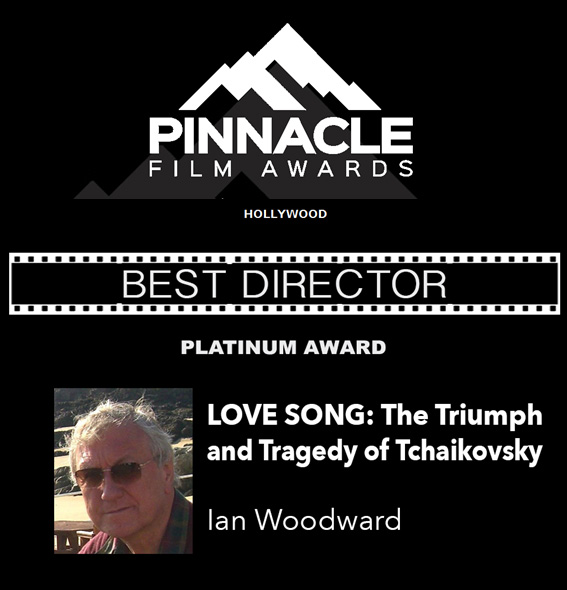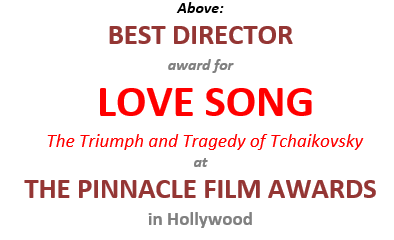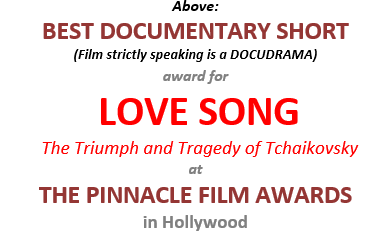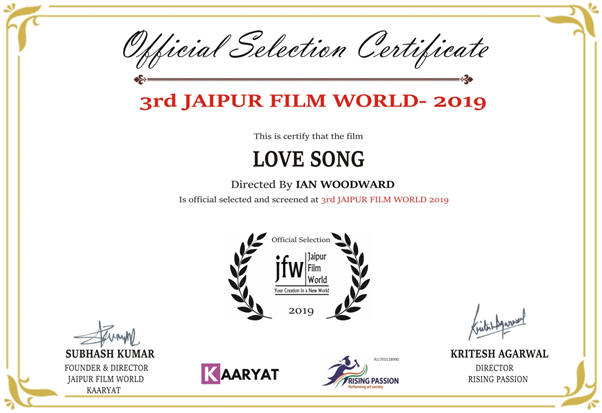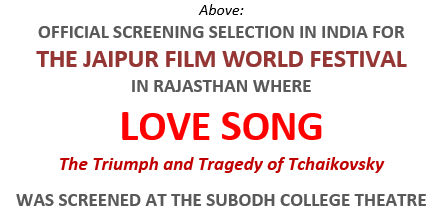The Triumph and Tragedy of Tchaikovsky
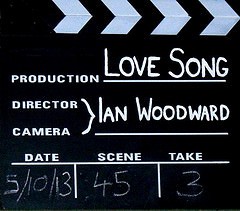

IMDb: http://www.imdb.com/title/tt3573762/?ref_=fn_al_tt_1
Love Song is based on life-long, ground-breaking research by Tchaikovsky aficionado and filmmaker Ian Woodward who reveals for the first time the sensational heart-breaking true story behind the creation of Tchaikovsky’s fantasy overture Romeo and Juliet which gave the world one of the most famous love themes ever written.
The facts are presented in biopic form. All the characters depicted in the film actually existed, although some moments have been fictionalised to fill-in gaps where details are scant or non-existent. The result is Love Song: The Triumph and Tragedy of Tchaikovsky.
A cinematic first that will rock the classical music Establishment.
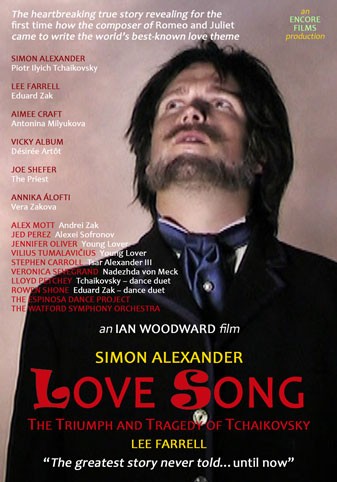
“This movie is a masterpiece.”
Dr Mario Kraiger, Deputy Festival Director,
The Golden Diana International Film Festival, Austria
LOVE SONG: LOG LINE
Sensational biopic drama revealing for the first time that Tchaikovsky’s Romeo and Juliet Love Theme is not about a teenage boy and girl in love…not even about a girl.
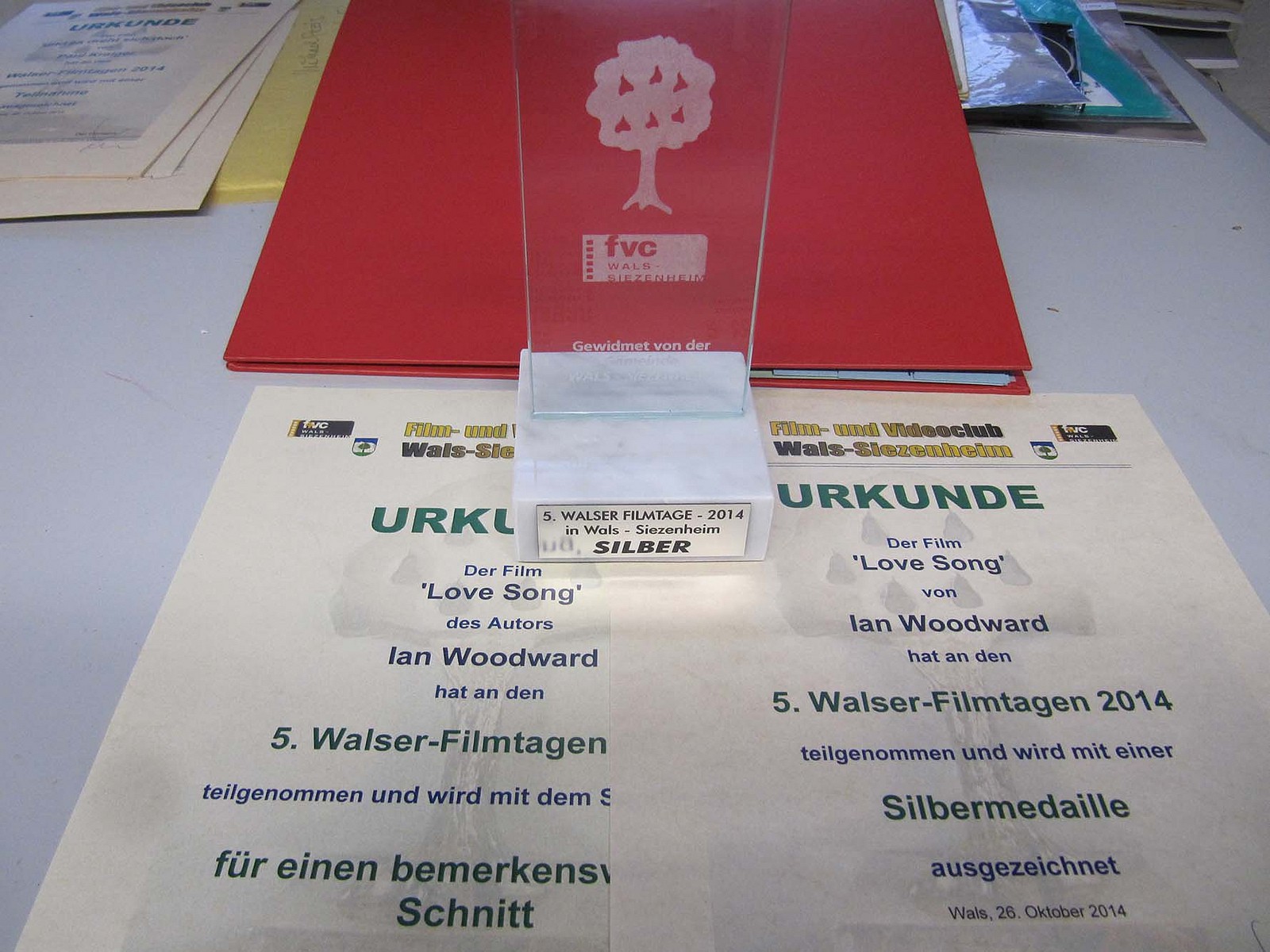
LOVE SONG: CONCEPT
The film’s story is told through the voice of Tchaikovsky as he looks back on his life in “old age”. (He died aged 53 but, with his pale-grey hair, looked much older). The scenes are enacted against the voice-over of Tchaikovsky, combined with spoken dialogue to camera, and accompanying music by the composer that underscores a scene’s atmosphere. Tchaikovsky is depicted in two crucial periods: 1. at the age of 29 at the start of his relationship with Eduard Zak, and 2. at 53 as he looks back on his life. But there are also some key scenes when he is aged 33.
LOVE SONG: OVERVIEW
Love Song is based on extensive original research by the film-maker which he believes reveals for the first time on film the real story behind the creation of Tchaikovsky’s fantasy overture Romeo and Juliet which gave the world one of the most famous love themes ever written. The facts are presented in biopic form. All the characters depicted in the film actually existed, although some moments have been fictionalised to fill-in gaps where details are scant or non-existent. The scenarist therefore set himself a rule at the outset which he has not knowingly broken: there is nothing in the film which could not have happened. The intention has been to weave together the known facts and the scenarist’s imagination, the latter filling in the gaps left by the former. The result is Love Song: The Triumph and Tragedy of Tchaikovsky.

LOVE SONG: IAN WOODWARD
Ian Woodward was privileged to know – for five years before her death in 1985 – Galina von Meck, the great-grandniece of Tchaikovsky and the granddaughter of his patron Nadezhda von Meck. She explained how she was aged two when Tchaikovsky held her in his arms. The filmmaker was also friends for many years with the Russian composer Alexander Tcherepnin, whose father, Nikolai Tcherepnin (pupil of Nikolai Rimsky-Korsakov and acquaintance of Tchaikovsky) was also a composer and music director of Diaghilev’s legendary Ballets Russes.
Ian Woodward listened, enthralled, at one of Alexander Tcherepnin’s famous soirées, as Alexander told him stories about Tchaikovsky told to him by his father Nicholas. It was famously at one these soirées that Ian Woodward, on being introduced to a sculptor named Oleg Prokofiev, asked “Any relation to the composer of the ballet Romeo and Juliet?” Oleg replied: “Yes, he was my dad!” Much of what the film-maker learned from Galina von Meck and Alexander Tcherepnin – not least that which is pertinent to the film’s revelations – appears in Love Song.
TCHAIKOVSKY: ROMEO AND JULIET FANTASY OVERTURE
In 1869, while employed as a professor at the Moscow Conservatory, Tchaikovsky wrote Romeo and Juliet which he based on Shakespeare’s play of the same name. Although described by the composer as a Fantasy Overture, the overall design is that of a symphonic poem. It is based on three main strands of the Shakespeare story. The first strand represents the saintly Friar Laurence. This is followed by the warring Capulets and Montagues. Finally, in the third strand, is the “love theme” representing two lovers. The music for this episode is passionate and yearning but always with an underlying current of anxiety. It is the most famous and well-loved section of the piece and shows how the protagonists’ forbidden love affair grows against all odds, even after death.
TCHAIKOVSKY: PROFESSIONAL LIFE
Peter Ilyich Tchaikovsky (1840-1893) was the first Russian composer whose music made a lasting impression internationally. He wrote many works which are popular with the music public today including, in addition to his Romeo and Juliet Fantasy Overture, the “1812” Overture, his ballets The Nutcracker, Swan Lake, The Sleeping Beauty, and Marche Slave. These, along with his First Piano Concerto and his Violin Concerto, the last three of his six numbered symphonies and his operas The Queen of Spades and Eugene Onegin, are among his most familiar works.
TCHAIKOVSKY: PATRONAGE (1)
NADEZHDA VON MECK, the wealthy widow of a railway tycoon, became Tchaikovsky’s patroness in 1877. She provided him with an annual subsidy that enabled him to concentrate on composition. She was an important friend and emotional support for the next 13 years.
TCHAIKOVSKY: PATRONAGE (2)
TSAR ALEXANDER III was among Tchaikovsky’s greatest admirers. He conferred upon him the Order of St. Vladimir, which carried with it hereditary nobility and won Tchaikovsky personal audiences with the Tsar. He was later awarded a lifetime annual pension of 3,000 rubles from the Tsar. On the composer’s death, Alexander III ordered that Tchaikovsky should be given a State funeral, for which he paid the costs. Moreover, Alexander III gave special permission for Tchaikovsky’s memorial service to be held at Kazan Cathedral in St. Petersburg. The funeral itself was the most attended funeral Russia had ever known. Kazan Cathedral holds 6000 people, but 60,000 people applied for tickets to attend the service. Finally, 8000 people were crammed in.
TCHAIKOVSKY: PERSONAL LIFE
Tchaikovsky’s life was punctuated by personal crises and depression. His same-sex orientation, which he kept private, has traditionally been considered a major factor behind these crises. His sudden death at the age of 53 is generally ascribed to cholera; there is an ongoing debate as to whether it was accidental or self-inflicted. Tchaikovsky spent the final period of his life at a charming house on the edge of Klin, 50 miles north-west of Moscow. Following his death in 1893 the estate was converted into the Tchaikovsky House-Museum which is maintained just as it was when Tchaikovsky lived there.
TCHAIKOVSKY: SEXUALITY
Some of the composer’s closest relationships were with men. He sought out the company of other same-sex attracted men in his circle for extended periods, associating openly and establishing professional connections with them. One group of musicologists insist that Tchaikovsky felt tainted because of his sexual nature. Another group of scholars suggest that he eventually came to see his sexuality as an insurmountable and even natural part of his personality from which he did not experience any serious psychological damage. Nevertheless, Tchaikovsky was torn by ambivalent feelings on the subject of sexuality and marriage.
TCHAIKOVSKY: ENGAGEMENT
Désirée Artôt, a Belgian soprano, was the Maria Callas of her day. In 1868 she visited Russia with a touring Italian company and met Tchaikovsky. She bombarded him with invitations on a daily basis, and he became accustomed to visiting her in the evenings. This was Tchaikovsky’s first serious attempt to conquer his homosexuality. They became engaged but Artôt was not prepared to abandon her career to support a struggling composer, and Tchaikovsky for his part was not prepared to become merely a prima donna’s husband. Artôt then secretly and suddenly married a Spanish baritone. Tchaikovsky was distraught when he heard the news.
TCHAIKOVSKY: MARRIAGE
In July 1877, aged 37, Tchaikovsky married 29-year-old former music student Antonina Milyukova after receiving a series of impassioned letters from her. After the marriage in Moscow she was known as Antonina Tchaikovskaya. Her family belonged to the local gentry but lived in poverty. They were married at the Church of Saint George in Moscow and held their wedding dinner at the Hermitage Restaurant. The marriage was disastrous. A permanent separation followed after only six weeks of them being together. They never lived under the same roof again nor had any children. They never divorced. Tchaikovsky would sometimes confess that the episode left him with a deep sense of shame and guilt and an apprehension that Antonina might publicize his sexual orientation. Although she outlived Tchaikovsky by 24 years, she spent the last 20 of them in an insane asylum.
TCHAIKOVSKY: RELATIONSHIP WITH EDUARD ZAK
Tchaikovsky had a series of male lovers beginning in his student days and continuing through the rest of his life. Allied with this is the fact that stories of doomed love always resonated deeply with the composer. Shakespeare’s tragedy Romeo and Juliet was no exception. When, aged 29, Tchaikovsky took up the play as a musical subject, he was deeply in love with Eduard Zak, a 15-year-old student at the Moscow Conservatory. Later, at 37, after the collapse of his marriage, he wrote: “Only now have I finally begun to understand that there is nothing more fruitless than not wanting to be that which I am by nature”. At the end of his life he was still pining over the loss of Eduard Zak.
TCHAIKOVSKY: PERSONALITY AND DEMEANOUR
Tchaikovsky was a sociable, amiable, friendly and well-balanced individual. Despite this, he was also by nature a pessimist, fueled by emotional intensity and relentless depression. And yet Tchaikovsky’s personality was the impetus behind what made his music his. Orchestras he conducted talked of his modest, unassuming personality, devoid of ego. He was a well-rounded individual, having experienced life’s triumphs and disappointments, and, while showing a wariness of strangers, possessed a great affection for his family and friends. He was humorous and playful by nature. He had a regal, aristocratic, upright bearing. His movement when walking was leisurely, measured and confident. He was socially adept and, at a gathering where he knew no-one – but where everyone knew him – he would be the first to engage in conversation. Although shy by nature, he easily put people at ease. A lifelong vice was nicotine – he smoked like a chimney – and he had a fondness for alcohol.
LOVE SONG: “LOVE THEME” STAGE PREMIERE
The “Love Theme” ballet duet, which forms the pivotal core of the film, was choreographed especially for Love Song by the internationally renowned dancer and choreographer Yat-Sen Chang, former principal dancer of London’s world-famous English National Ballet. The film’s dance director was Corinna Chute. After graduating from the Royal Ballet School she performed with ballet, jazz and contemporary companies in Italy and Holland. Later, following her role as European Representative of the Cuban National Ballet School’s international ballet courses “CUBALLET”, she became Artistic Director of the celebrated Espinosa Chute Centre in the historic town of Berkhamsted, Hertfordshire, just outside London, where Love Song received its glittering big-screen premiere on 16 February 2014 in front of cast and crew, friends and family and other invited guests. The Love Song pas de deux featuring Tchaikovsky and Zak was given its world stage premiere on 17 August by the Espinosa Dance Project company at the Espinosa Chute Centre Theatre in Berkhamsted. The ballet, called Tchaikovsky’s “Love Theme”, was part of a mixed-bill programme. It was repeated on 18 August 2013. Starring in the two theatre performances, as in the film itself, was the acclaimed Serbian National Ballet soloist Lloyd Petchey as Tchaikovsky with the Tring Park School for the Performing Arts’ much-in-demand Rowen Shone as Eduard Zak.
The Lighting Designer for Love Song’s two crucial sequences with ballet dancers was the renowned Doz Brook, the man behind the lighting for many stage productions in London’s West End.
LOVE SONG: EPILOGUE
DÉSIRÉE ARTÔT became a singing teacher after her retirement and died in Paris 14 years after the death of Tchaikovsky. ANTONINA MILYUKOVA, who outlived Tchaikovsky by 24 years – spending the last 20 of them in an insane asylum – never stopped loving her husband. NADEZHDA VON MECK, who supported Tchaikovsky financially for 13 years, died of heart-break barely two months after the composer’s death. ALEXEI SOFRONOV inherited much of Tchaikovsky’s wealth and, after buying the house at Klin, helped to found the Tchaikovsky memorial museum which exists to this day. TSAR ALEXANDER III awarded Tchaikovsky a lifetime pension, paid the costs of the composer’s epic funeral, and died 11 months later. TCHAIKOVSKY, through the sale and performance of his music on disc, television and the stage, in films and the concert hall, became the world’s most popular and biggest-selling composer. EDUARD ZAK’S family history, following his suicide, remains a mystery. But as the inspiration behind one of the most famous love themes ever written, Eduard’s legacy will endure for as long as romance inflames the human spirit.
LOVE SONG: CREDITS
Director and Producer
IAN WOODWARD
Music
PIOTR ILYCH TCHAIKOVSKY
Screenplay
IAN WOODWARD
Hair and Make-up Artist
ANN-MARIE MAYS
Costume Designer
ANDREA GAMBELL
Sound
ELMER GOLDMAN
Choreographer
YAT-SEN CHANG
Cinematographer and Editor
IAN WOODWARD
Cast
Piotr Ilyich Tchaikovsky
SIMON ALEXANDER
Eduard Zak
LEE FARRELL
Antonina Milyukova
AIMEE CRAFT
Désirée Artôt
VICKY ALBUM
The Priest
JOE SHEFER
Vera Zakova
ANNIKA ÁLOFTI
Andrei Zak
ALEX MOTT
Nadezhda von Meck
VERONICA SEVEGRAND
Young Lover
JENNIFER OLIVER
Young Lover
VILIUS TUMALAVIČIUS
Tsar Alexander III
STEPHEN CARROLL
Young Society Lady
JENNIFER OLIVER
Alexie Sofronov
JED PEREZ
Anatoly Tchaikovsky
MARCUS PAYNE
Josef Kotek
COURTNEY HARRISON
Drinking Companion 1
JAMES McCLELLAND
Drinking Companion 2
SIMON WILLSHIRE
Funeral Cortège Attendants
COURTNEY HARRISON
DAVID SMYTH
MARCUS PAYNE
JED PEREZ
VILIUS TUMALAVIČIUS
SIMON WILLSHIRE
Narrator
TRISH BERTRAM
Organist
ROBERT HALL
Equine specialist
KATARINA BOHOVOVA
“Love Theme” BALLET SEQUENCE
choreographed exclusively for Love Song
Dance Sequence Director
CORINNA CHUTE
Choreographer
YAT-SEN CHANG
(former principal dancer
English National Ballet)
Tchaikovsky
LLOYD PETCHEY
(Serbian National Ballet)
Eduard Zak
ROWEN SHONE
Apotheosis sequence
Dancers:
Polly Almond
Bethany Brown
Lily English
Lyn Fear
Roseanna Fear
Erina Forde
Tiana Kirkby
Bethany Freeman
Eliza Freeman
Justine Freeman
Joseph Howse
Gwen Morgan
Hannah O’Dair
Anna Perry
Madeleine Phillips
Honor Rooke
Kerry Rhodes
Rebecca Rumble
Tia Slade
who appear by permission of The Espinosa Chute Centre Berkhamsted
Lighting Designer for Love Theme ballet sequence and Apotheosis sequence
DOZ BROOK
(with assistance on Love Theme by Rob Lindsay)
THE WATFORD SYMPHONY ORCHESTRA
Leader Rebecca Boyle
Conductor Edward Kay
Gaffers
ALICE CONNOLLY
JAMIE MONTGOMERY
KIERAN SIMPSON
3rd Assistant Directors
JADE MONTOUTE
ALEXIS TYMON
Production Runners
MAAHIN AKHLAQUE
LOTTIE BUTCHER
JACK CAMERON
TUHIN CHOWDHURY
LEE FRASER-CULLEN
ELIZABETH GBEJUADE
KATHERINE PORTER
Assistants to Key Hair and Make-up Specialist Ann-Marie Mays
Make-up Artists
JADE SAWYERR
NASTJA STARIC
Trainee Make-up Artists
BETH BURTON
CHRISTINE MASON
Sound Assistants
JADE MONTOUTE
ALEXIS TYMON
MAAHIN AKHLAQUE
JACK CAMERON
ELIZABETH GBEJUADE
Thanks
BUCKS MEADOW RIDING SCHOOL
SHAKIRA EDGHILL
THE ESPINOSA DANCE PROJECT
Berkhamsted
Director: Corinna Chute
Artistic Director: Yat-Sen Chang
THE ESPINOSA CHUTE CENTRE
Berkhamsted
Director: Corinna Chute
FANHAMS HALL HOTEL
Ware
HARTWELL HOUSE & SPA
Aylesbury
PARISH CHURCH OF ST PETER
Great Berkhamsted
CATHY SHIPMAN
PHOEBE TAPLIN
SALLY TRENDELL
ST JOHN THE BAPTIST CHURCH
Aldenham
JOE and HEATHER WARWICK
WHITE HART HOTEL
St Albans
ZENKA WOODWARD
Special thanks to
MOOR PARK GOLF CLUB
(Rickmansworth)
Robert Fortey
Nico Fortuna
Swee-Lan Miller
for outstanding assistance during the making of this film
LOVE SONG: THE SOUNDTRACK SCORE
For those who enjoy feasting on the music of Tchaikovsky, the score served up in Love Song amounts to a banquet. The soundtrack incorporates extracts from a tantalizingly wide selection of the Russian composer’s works, including –
BALLET
Swan Lake, The Nutcracker, The Sleeping Beauty
OPERA
Eugene Onegin, The Queen of Spades, Iolanta, Cherevichki, The Maid of Orleans
INCIDENTAL
The Snow Maiden
SYMPHONY
No 2 (“Little Russian”), No 3 (“Polish”), “Manfred” Symphony
ORCHESTRAL
Souvenir de Florence, Fantasy overture Romeo and Juliet, “1812” Overture, Coronation March for Tsar Alexander III
KEYBOARD
Romance in F minor, Piano Concerto No 1 in B-flat minor
CHAMBER
String Quartet No 1 in D
CHURCH
The Liturgy of St John Chrysostom
LOVE SONG: SUMMARY
A big-budget feature film about Tchaikovsky is currently under way in Russia, partly funded by the Russian government. But the film’s finance was only forthcoming after five script rewrites were demanded. All references to the composer’s homosexuality were ordered to be removed. The orders were complied with.
It is often said that the gay community have taken to their hearts Tchaikovsky’s music as it is perceived to contain all the longing and despair of homosexual angst in a homophobic world. The composer has been described as the original gay romantic.
There is a possibility that Love Song: The Triumph and Tragedy of Tchaikovsky may be shown at a St Petersburg film festival in late October – a Russian festival, it should be stressed, organised in Greece.
“Whatever happens,” asserts Ian Woodward, “homophobic Russia is not going to like Love Song!”
But then Love Song is not just a film – the story it tells is an exclusive disclosure.
The artistic and historical revelation the film makes has never previously been made public on the printed page, on the theatre stage, or on the small or big screens.
The film is as much about the disclosure of the newly-revealed gay content in a musical masterpiece – its source known in literature as a classic male-female romance – as it is about the world’s most popular love theme.
Ian Woodward – author of the acclaimed two-volume Lives of the Great Composers (published in English, Dutch, German and Arabic) – has lovingly and obsessively studied Russia’s greatest composer, Tchaikovsky, since his teen years. He owns every book ever published about the composer, in every language. His CD library contains recordings of every work ever composed by Tchaikovsky
The filmmaker’s detective work into Tchaikovsky’s fantasy overture Romeo and Juliet meant that for many years he held a secret bombshell…that although the world’s most famous Love Theme has been used in hundreds of films, TV shows and commercials, usually during that moment when one character first spots their true love, it is NOT about Verona’s star-cross’d lovers as immortalised by Shakespeare.
It is not even about a teenage boy and girl in love…and it is certainly not about a girl.
Love Song, for the first time, tells all.
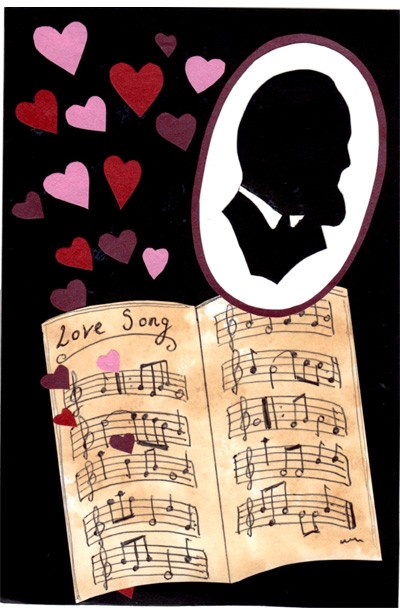
Above: Specially-created “Thank you” card sent to
the filmmaker by production runner Lottie Butcher
who designed and produced the card
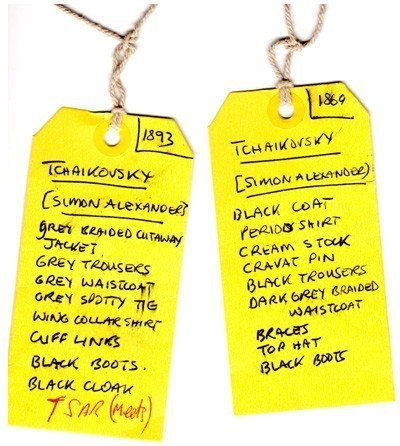
Above: Costume designer Andrea Gambell’s labels
for two of the costumes worn by Tchaikovsky
at different times in his life in Love Song
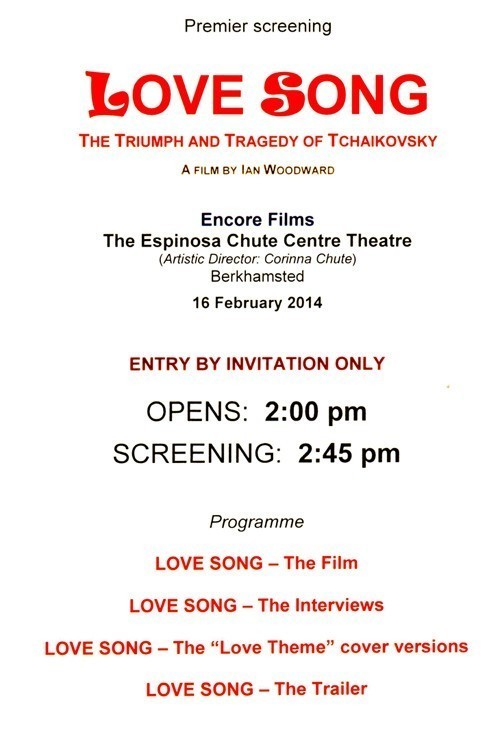
Above: Theatre poster for the big-screen premiere of Love Song



